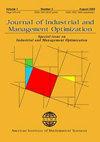Bus voltage stability control of DC microgrid considering voltage constraints
IF 1.6
4区 工程技术
Q3 ENGINEERING, MULTIDISCIPLINARY
引用次数: 0
Abstract
Aiming at the bus voltage fluctuation caused by nonlinearity, limited bus voltage change and uncertain factors such as bus voltage deviation, load and system parameter change caused by traditional droop control in DC microgrid, a precise bus voltage control scheme considering voltage constraints is proposed. Firstly, parabolic droop control is used to replace the traditional linear droop control to improve the accuracy of power distribution. On this basis, a bus voltage controller based on barrier Lyapunov function is designed to precisely control the voltage of droop control to reach the expected value. The controller adopts backstepping method to deal with nonlinear problems; the barrier Lyapunov function is used to design the system to meet the condition of voltage constraints; RBF neural network is used to eliminate the uncertainty in the system and improve the disturbance suppression ability of the system. The simulation results show that the designed controller can ensure voltage stability when the load changes and the system parameters change, and its performance is better than that of PI control. It can achieve high-precision control of bus voltage and load distribution when the state is limited. The simulation results verify that this control strategy can reduce voltage drop and achieve bus voltage stability.考虑电压约束的直流微电网母线电压稳定控制
针对直流微电网中传统下垂控制引起的非线性、有限母线电压变化以及母线电压偏差、负载和系统参数变化等不确定因素造成的母线电压波动,提出了一种考虑电压约束的精确母线电压控制方案。首先,采用抛物线下垂控制取代传统的线性下垂控制,提高功率分配精度;在此基础上,设计了基于势垒Lyapunov函数的母线电压控制器,精确控制垂控电压达到期望值。控制器采用反步法处理非线性问题;利用势垒Lyapunov函数设计满足电压约束条件的系统;采用RBF神经网络消除了系统中的不确定性,提高了系统对扰动的抑制能力。仿真结果表明,所设计的控制器在负荷变化和系统参数变化时都能保证电压稳定,其性能优于PI控制。在状态受限的情况下,实现对母线电压和负载分布的高精度控制。仿真结果验证了该控制策略可以减小电压降,实现母线电压稳定。
本文章由计算机程序翻译,如有差异,请以英文原文为准。
求助全文
约1分钟内获得全文
求助全文
来源期刊
CiteScore
2.50
自引率
15.40%
发文量
207
审稿时长
18 months
期刊介绍:
JIMO is an international journal devoted to publishing peer-reviewed, high quality, original papers on the non-trivial interplay between numerical optimization methods and practically significant problems in industry or management so as to achieve superior design, planning and/or operation. Its objective is to promote collaboration between optimization specialists, industrial practitioners and management scientists so that important practical industrial and management problems can be addressed by the use of appropriate, recent advanced optimization techniques.

 求助内容:
求助内容: 应助结果提醒方式:
应助结果提醒方式:


